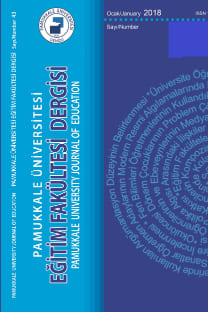İlköğretim Öğrencilerinin Orantısal Akıl Yürütme Becerileri İle Problem Kurma Becerileri Arasındaki İlişki
Oran ve orantı, orantısal akıl yürütme becerisi, problem kurma becerisi
The Relationship Between Elementary School Studentsâ Proportional Reasoning Skills And Problem Posing Skills
___
- Abu-Elwan, R. (1999). The development of mathematical problem posing skills for prospective middle school teachers. In A. Rogerson (Ed.) Proceedings Of The International Conference On Mathematical Education Into the 21st Century: Social Challenges, Issues And Approaches, Cairo, Egypt. 2, (pp. 1-8).
- Akkuş, O. ve Duatepe A. (2002). İlköğretim matematik öğretmen adaylarının akıl yürütme becerileri üzerine bir çalışma. Hacettepe Üniversitesi Eğitim Fakültesi Dergisi, 23, 32-40.
- Akkuş, O. ve Duatepe-Paksu, A. (2006). Orantısal akıl yürütme becerisi testi ve teste yönelik dereceli puanlama anahtarı geliştirilmesi, Eğitim Araştırmaları, 6, 25, 1-10.
- Akar, G. K. (2009). Oran konusunun kavramsal öğreniminde karşılaşılan zorluklar ve çözüm önerileri. E. Bingölbali & M.F. Özmantar (Eds.) İlköğretimde Karşılaşılan Matematiksel Zorluklar ve Çözüm Önerileri,(sf. 263-285). Pegem Akademi.
- Akkan, Y., Çakıroğlu, Ü. ve Güven, B. (2009). İlköğretim 6. ve 7. sınıf öğrencilerinin 10 denklem oluşturma ve problem kurma yeterlilikleri. Mehmet Akif Ersoy Üniversitesi Eğitim Fakültesi Dergisi, 17, Haziran 2009, 41-55.
- Cai, (2003) Singaporean students’ mathematical thinking in problem solving and problem posing: An exploratory study. International Journal of Mathematical Education in Science and Technology, 34 (5), 719-737.
- Christou, C., Mousoulides, N., Pittalis, M., Pitta- Pantazi, D. & Sriraman, B. (2005). An empirical taxonomy of problem posing processes. The International Journal on Mathematics Education, Vol, 37, 3, 149-158.
- Cramer, K., Post, T., Currier, S. (1993). Learning and teaching ratio and proportion: Research implications. In Research Ideas For The Classroom: Middle Grades Mathematics, D. Owens (Ed.), pp. 159–178. New York: Macmillan.
- Crespo, S. (2003). Learning to pose mathematical problems: Exploring changes in preservice teachers’ practices. Educational Studies in Mathematics, Vol. 52, No. 3, 243-270.
- English, L, D. (1997a). The development of fifth- grade children’s problem-posing abilities. Educational Studies in Mathematics, 34, (pp. 183 -217).
- English, L, D. (1997b). Development of seventh- grade students’ problem-posing. Proceedings of the Conference of the International Group for the Psychology of Mathematics Education, 2, (pp. 249- 256).
- English, L, D. (1998). Children’s problem posing within formal and informal contexs. Journal for Research in Mathematics Education. 29 (1), (pp. 83- 106).
- Fidan, S. (2008) İlköğretim 5. sınıf matematik dersinde öğrencilerin problem kurma çalışmalarının problem çözme başarısına etkisi. Yüksek lisans tezi, Gazi Üniversitesi, Ankara.
- Kilpatrick, J. (1987). Problem formulating: where do good problems come from? In A.H.Schoenfeld (Ed). Cognitive Science and Mathematics Education, Hillsdale, NJ; Erlaum, (pp.123-147).
- Korkmaz, E. ve Gür, H. (2006). Öğretmen adaylarının problem kurma becerilerinin belirlenmesi. BAÜ Fen Bilimleri Enstitüsü Dergisi. 2006, 8 (1), 64-74.
- Langrall, C. W. & Swafford, J. (2000). Three balloons for two dollars; Developing proportional reasoning. Mathematics Teaching in the Middle School, 6 (4), (pp. 254-261).
- Lesh R., Behr, M., & Post, T. (1988). “Number concepts and operations in the middle grades” Proportional Reasoning. In J. Hiebert & M. Behr (Eds.), (pp. 93-118). Reston, VA: National Council of Teachers of Mathematics.
- Lesh, R., Post, T. & Behr, M. (1989). Proportional Reasoning. In M. Behr & J. Hiebert (Eds.) Number Concepts and Operations in the Middle Grades. Reston, VA: National Council of Teachers of Mathematics.
- Lowrie, T. (2002). Young children posing problems: The influence of teacher intervention on the type of problems children pose. Mathematics Education Research Journal 2002, Vol. 14, No. 2, 87-98.
- Millî Eğitim Bakanlığı (MEB) (2008). İlköğretim matematik dersi 6-8. Sınıflar öğretim program ve kılavuzu. M.E.B: Ankara.
- Mamona-Downs, J. (1993). On analysing problem posing. In: I. Hirabayashi, N. Nohada, K. Shigematsu, F. L. Lin (Eds.), Proceedings of the 17th Conference of the International Group for the Psychology of Mathematics Education. Tsukuba, Japan, 3, (pp. 41-47).
- National Council of Teachers of Mathematics (NCTM) (1989). Curriculum And Evaluation Standards For School Mathematics, National Council Teachers of Mathematics Pub, Reston: VA.
- National Council of Teachers of Mathematics (NCTM) (2000). Principles and Standards For School Mathematics. Reston VA: NCTM.
- Silver, E. A. (1994). On mathematical problem posing. For the Learning of Mathematics, 14 (1), (pp. 19-28).
- Silver, E., A., Cai, J. (1996). An analysis of arithmetic problem posing by middle school. Journal For Research in Mathematics Education, 27, (pp. 521- 539). 11
- ISSN: 1301-0085
- Yayın Aralığı: 3
- Başlangıç: 1996
- Yayıncı: -
Resimli Matematik Terimleri Sözlüğü
Öğretmen Adaylarının Sözel ve Görsel Temsillere Yönelik Kurdukları Problemlerin Analizi
Matematik Öğretmeni Adaylarının Matematik Tarihi Dersine İlişkin Düşünceleri
İlköğretim İkinci Kademe (6,7 ve 8. Sınıflarda) Matematik Öğretimi
Ahmet ÇELİK, Elif Yetkin Özdemir
